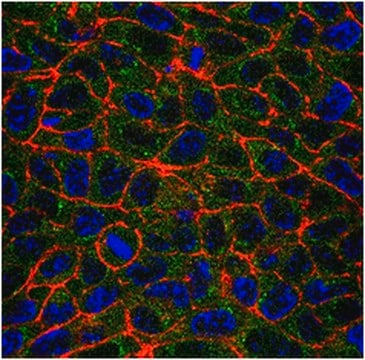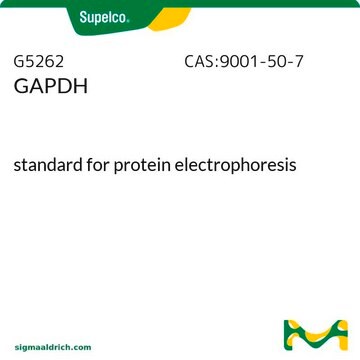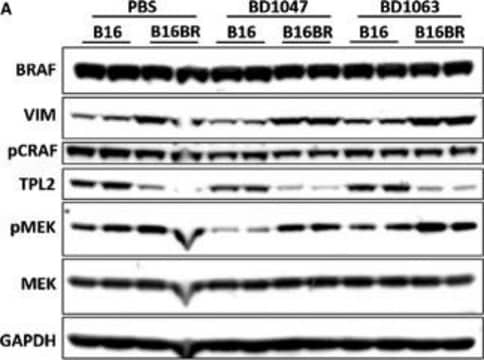MAB374
Anti-GAPDH Antibody
CHEMICON®, mouse monoclonal, 6C5
Synonym(s):
glyceraldehyde 3-phosphate dehydrogenase, aging-associated gene 9 protein, glyceraldehyde-3-phosphate dehydrogenase, GAPDH, G3PDH, GAPD, OK/SW-cl.12, MGC88685, G3PD, EC 1.2.1.12
About This Item
ICC
IF
IHC
IP
WB
immunocytochemistry: suitable
immunofluorescence: suitable
immunohistochemistry: suitable
immunoprecipitation (IP): suitable
western blot: suitable
Recommended Products
Product Name
Anti-Glyceraldehyde-3-Phosphate Dehydrogenase Antibody, clone 6C5, clone 6C5, Chemicon®, from mouse
biological source
mouse
Quality Level
antibody form
purified immunoglobulin
antibody product type
primary antibodies
clone
6C5, monoclonal
species reactivity
human, feline, pig, mouse, rabbit, fish, canine, rat
should not react with
E. coli
manufacturer/tradename
Chemicon®
technique(s)
ELISA: suitable
immunocytochemistry: suitable
immunofluorescence: suitable
immunohistochemistry: suitable
immunoprecipitation (IP): suitable
western blot: suitable
isotype
IgG1
NCBI accession no.
UniProt accession no.
shipped in
wet ice
target post-translational modification
unmodified
Gene Information
human ... GAPDH(2597)
mouse ... Gapdh(14433)
General description
Specificity
Immunogen
Application
1:1,000,000 dilution of a previous lot ws used for Immunoaffinity purification of GAPDH.
Immunocytochemistry:
1:100 to 1:300 dilution of a previous lot was used in immunocytochemistry in PBS-BSA 10 mg/mL. 4% PFA, with 0.02% PBS-Triton X-100; 3 min RT (Griffoni, 2001).
Western blot:
1:100 to 1:300. Recognizes a 36kDa band of the reduced monomer. Non-reduced GAPDH runs as a 146kDa tetramer.
Immunoaffinity purification of GAPDH.
Optimal working dilutions must be determined by end user.
Metabolism
Enzymes & Biochemistry
Quality
Western Blot Analysis:
1:500 dilution of this antibody detected GLYCERALDEHYDE-3-PDH on 10 μg of A431 lysates.
Target description
Physical form
Storage and Stability
Analysis Note
It is expressed in all cells.
Legal Information
Disclaimer
Not finding the right product?
Try our Product Selector Tool.
recommended
Storage Class Code
12 - Non Combustible Liquids
WGK
WGK 2
Flash Point(F)
Not applicable
Flash Point(C)
Not applicable
Certificates of Analysis (COA)
Search for Certificates of Analysis (COA) by entering the products Lot/Batch Number. Lot and Batch Numbers can be found on a product’s label following the words ‘Lot’ or ‘Batch’.
Already Own This Product?
Find documentation for the products that you have recently purchased in the Document Library.
Customers Also Viewed
Articles
Immunofluorescence uses antibody-conjugated fluorescent molecules for protein localization, modification confirmation, and protein complex visualization.
Immunofluorescence uses antibody-conjugated fluorescent molecules for protein localization, modification confirmation, and protein complex visualization.
Immunofluorescence uses antibody-conjugated fluorescent molecules for protein localization, modification confirmation, and protein complex visualization.
Immunofluorescence uses antibody-conjugated fluorescent molecules for protein localization, modification confirmation, and protein complex visualization.
Protocols
Tips and troubleshooting for FFPE and frozen tissue immunohistochemistry (IHC) protocols using both brightfield analysis of chromogenic detection and fluorescent microscopy.
Tips and troubleshooting for FFPE and frozen tissue immunohistochemistry (IHC) protocols using both brightfield analysis of chromogenic detection and fluorescent microscopy.
Tips and troubleshooting for FFPE and frozen tissue immunohistochemistry (IHC) protocols using both brightfield analysis of chromogenic detection and fluorescent microscopy.
Tips and troubleshooting for FFPE and frozen tissue immunohistochemistry (IHC) protocols using both brightfield analysis of chromogenic detection and fluorescent microscopy.
Our team of scientists has experience in all areas of research including Life Science, Material Science, Chemical Synthesis, Chromatography, Analytical and many others.
Contact Technical Service
















